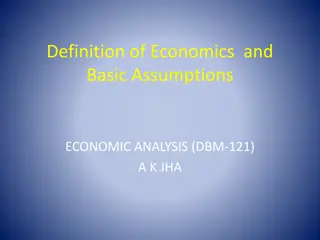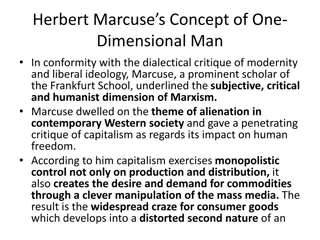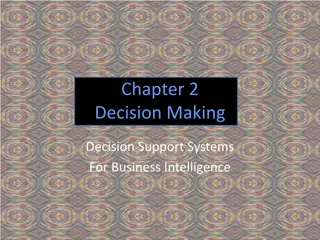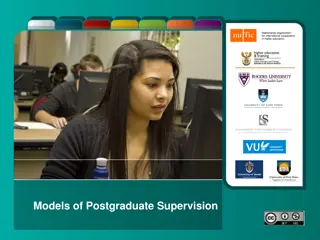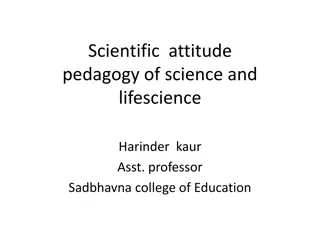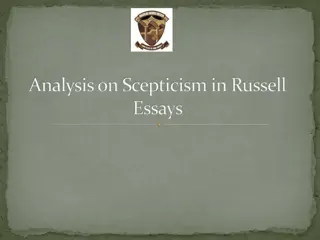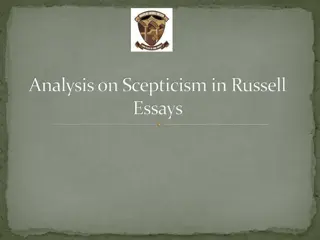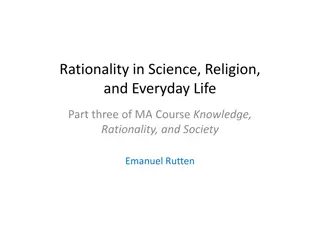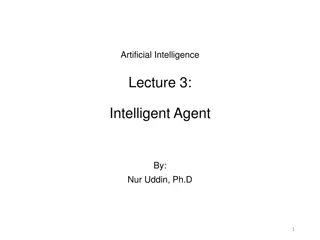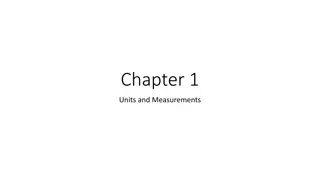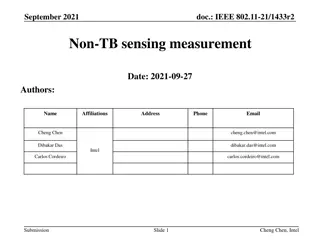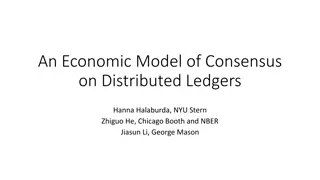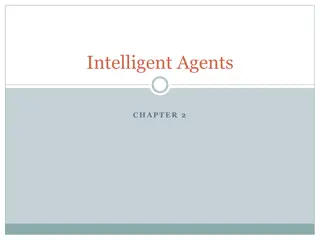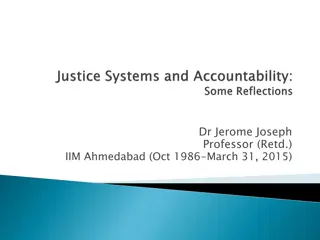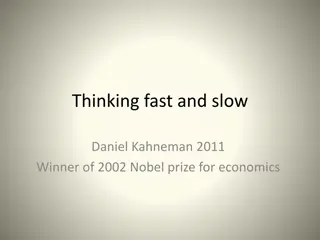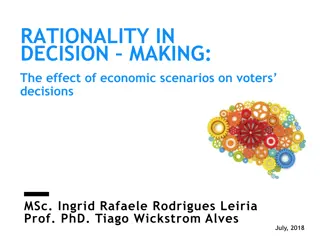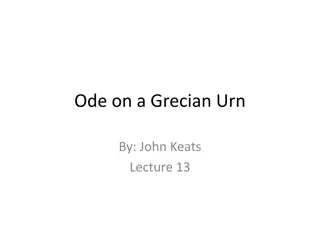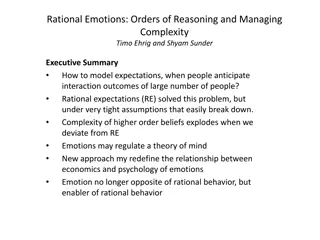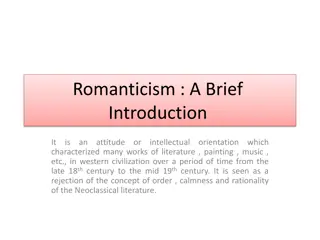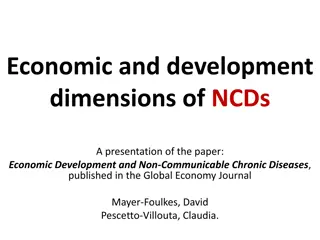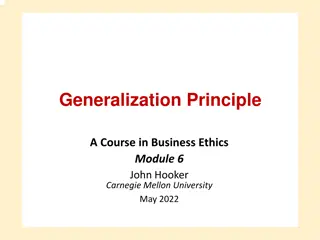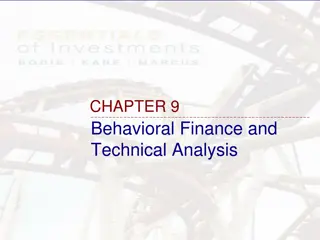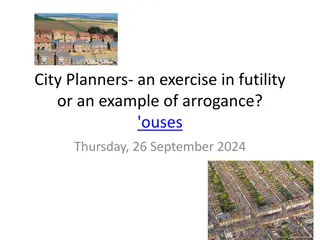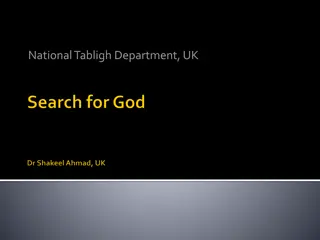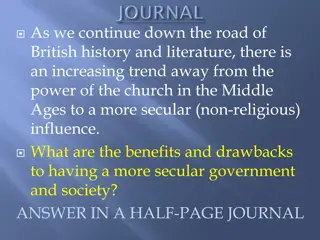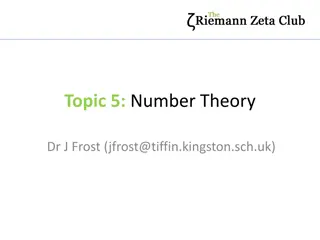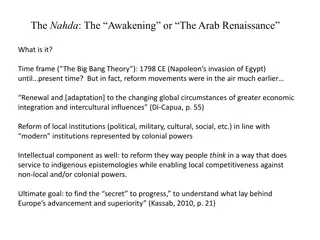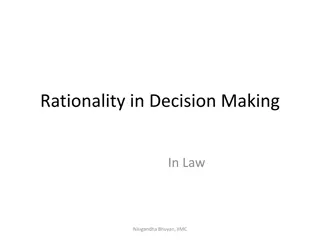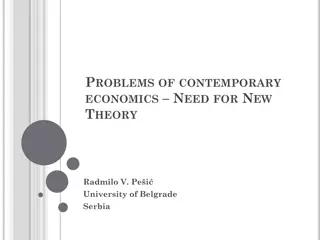Understanding Economics: Definitions and Basic Assumptions
Economics is a social science that examines how individuals, businesses, and governments allocate resources to satisfy unlimited wants in the face of scarcity. It involves decision-making processes and the study of human behavior in relation to the allocation of scarce resources. Basic assumptions l
0 views • 9 slides
Understanding Non-Aqueous Solvents: Types and Classification
Inorganic non-aqueous solvents play a crucial role in chemical research and industry. This article by Dr. Princy K.G. delves into the classification of solvents based on protonicity, polarity, and aqueous vs. non-aqueous nature. It explores the types of non-aqueous solvents, such as protonic and non
1 views • 29 slides
Critiques of Modernity and Liberal Ideology: Marcuse and Habermas
Herbert Marcuse's concept of One-Dimensional Man critiques capitalism's impact on human freedom and alienation in Western society. Marcuse emphasizes awakening individuals to their alienation to ignite their urge for freedom. Jurgen Habermas, in contrast, focuses on rational critique rooted in human
1 views • 5 slides
A Mother's Tale: Night of the Scorpion by Nissim Ezekiel
One fateful night, a scorpion stings a mother, bringing together rationality and faith, rural life, superstitions, virtue, vice, and the undying love of a family. As the villagers seek remedies, the struggle between science and belief unfolds, ultimately leading to a poetic resolution of gratitude a
0 views • 7 slides
Decision Support Systems for Business Intelligence
This chapter delves into the nature of decision making, forms of rationality, causes of satisficing behavior, perception challenges, and the importance of using data to challenge assumptions in the realm of business intelligence. It emphasizes the significance of information attributes and describes
1 views • 13 slides
Understanding Models of Postgraduate Supervision and Different Supervisory Approaches
Explore the various roles, styles, and models of postgraduate supervision, delving into the distinctions between supervisor tasks, interaction approaches, and supervision structures. Learn how different supervision models like one-on-one, panel, project, and doctoral programme supervision impact res
1 views • 13 slides
Understanding Scientific Attitude and Pedagogy of Science
Scientific attitude involves open-mindedness, curiosity, rationality, and a desire for accurate knowledge. It includes characteristics such as critical thinking, respect for diverse viewpoints, and a reliance on verified information. Developing a scientific attitude involves studying superstitions,
1 views • 6 slides
Analysis on Scepticism in Russell Essays
This analysis delves into Bertrand Russell's perspective on scepticism, highlighting how it serves as a pathway to rationality and enables a critical yet positive outlook on life. Russell advocates for a moderate form of scepticism that challenges blind adherence to tradition and encourages scrutiny
1 views • 5 slides
Analysis on Scepticism in Russell's Essays
This analysis explores Bertrand Russell's perspective on scepticism, highlighting how it can lead to discovering truth, promoting positivity, and enhancing rationality in achieving life goals. Russell advocates for a moderate form of scepticism that encourages critical thinking and challenges blind
1 views • 5 slides
Understanding Game Theory and Oligopoly in Economics
Game theory is a valuable tool for analyzing strategic interactions among players in situations like oligopoly. The concept of dominant strategy and the classic example of the Prisoner's Dilemma shed light on how individual rationality can lead to suboptimal outcomes. The practical example of a cell
1 views • 27 slides
Rationality in Science, Religion, and Everyday Life: Exploring Belief Formation and Rational Decision-Making
Explore the essence of rational belief formation across science, religion, and daily life through the lens of cognitive processes, decision-making, and value systems. Delve into the conditions for rational belief, practical decision-making, and axiological rationality to understand human cognition a
1 views • 142 slides
Understanding Intelligent Agents in Artificial Intelligence
Intelligent agents in artificial intelligence act rationally to achieve the best outcomes in various environments. They operate autonomously, perceive their surroundings, adapt to changes, and pursue goals efficiently. Developing intelligent agents involves examining agents, environments, and their
1 views • 22 slides
Understanding Non-Firm Quantities in Electricity Markets
Non-Firm Quantities in electricity markets involve units with non-firm access not being compensated for their non-firm capacity not getting accommodated on the system. The concept of Firm Access Quantity plays a key role in determining compensation levels for units, with differences in implementatio
0 views • 6 slides
Understanding Units and Measurements in Physics
Physics is the study of nature and its phenomena, involving various physical quantities like mass, length, time, area, and volume. These quantities can be fundamental or derived, with units selected as standards for measurement. The System International (SI) units offer advantages like coherence, ra
0 views • 14 slides
Understanding Non-Compete Agreements: Enforceability and Requirements
Non-compete agreements are commonly used in the United States to protect businesses from competition by former employees. To be enforceable, these agreements must meet certain requirements, including independent consideration, protection of legitimate business interests, and reasonableness in scope,
0 views • 26 slides
Comparison of Trigger-based vs. Non-Trigger-based Sensing Measurement in IEEE 802.11
The document discusses the differences between Trigger-based (TB) and Non-Trigger-based (Non-TB) sensing measurement instances in IEEE 802.11 standards, focusing on who initiates the sensing measurement. TB sensing is initiated by the AP, while Non-TB sensing is initiated by a non-AP STA, enabling o
6 views • 13 slides
Economic Models of Consensus on Distributed Ledgers in Blockchain Technology
This study delves into Byzantine Fault Tolerance (BFT) protocols in the realm of distributed ledgers, exploring the complexities of achieving consensus in trusted adversarial environments. The research examines the classic problem in computer science where distributed nodes communicate to reach agre
0 views • 34 slides
Understanding Intelligent Agents in Chapter 2
This chapter delves into the concept of agents and environments in the realm of intelligent systems. It explores the types of agents, their functions, and interactions with environments. Rationality, performance measures, and the essence of being a rational agent are key aspects discussed. The vacuu
0 views • 28 slides
William Blake: Visionary Artist and Poet of the Romantic Movement
William Blake, an iconic figure in the Romantic Movement, was a visionary artist and poet known for works like "Songs of Innocence" and "Songs of Experience." His imaginative and prophetic books reflected a break from the Enlightenment philosophy, emphasizing emotion over rationality. Inspired by th
0 views • 27 slides
Exploring Anti-Enlightenment Traditions in the EU
This text delves into the concept of the anti-Enlightenment tradition and its influence on cynicism within the European Union. It analyzes the ideological roots, cultural implications, and political manifestations of this tradition, contrasting it with Enlightenment principles such as human rights,
0 views • 9 slides
Perspectives on Rationality and Management Practices
Explore the concepts of practical, theoretical, formal, and substantive rationality along with perspectives on management practices like Hierarchical-Control-Coercive and Empowered-Collegial-Consensus. It delves into Dr. Jerome Joseph's expertise and provides a comprehensive view of rational decisio
0 views • 20 slides
Understanding Religious Language: Flew, Hare, Mitchell
Exploring the contrasting views of cognitivism and non-cognitivism in the context of religious language through the perspectives of Flew, Hare, and Mitchell. Delve into Flew's challenge on the undetectable gardener, Hare's concept of bliks, and Mitchell's response to the rationality of religious bel
0 views • 7 slides
Insights from "Thinking, Fast and Slow" and Neuroscience Advances
Explore the shift in understanding human rationality from the mid-20th century to the present through works like "Thinking, Fast and Slow" by Daniel Kahneman. Delve into the impact of strong emotions on decision-making, the role of unconscious thinking in decision processes as discussed in "Stranger
0 views • 63 slides
Analyzing Economic Scenarios' Impact on Voters' Decision Making
This research explores how economic scenarios influence voters' decisions in a presidential election. It delves into the rationality assumptions in decision making, cognitive biases, and behavioral economics. Using experimental methodology, the study aims to uncover how voters weigh costs and benefi
0 views • 22 slides
Exploring John Keats's Negative Capability Theory in "Ode on a Grecian Urn
John Keats, known for his melancholic temperament, delved into the concept of Negative Capability in his poetry, particularly evident in "Ode on a Grecian Urn." This theory emphasizes the poet's ability to transcend rationality and immerse in intense emotions without the need for analysis or judgmen
0 views • 29 slides
Reimagining Rationality: Emotions and Economic Behavior
Modeling expectations in economic decision-making involves challenges beyond rational expectations theory. This executive summary explores the interplay between emotions and reasoning, proposing a new approach that considers emotions as enablers of rational behavior rather than opposing it. By intro
0 views • 5 slides
Blood Management and Conservation Strategies in Pandemic Times
Explore the rationality behind patient blood management, the importance of audit in ensuring proper blood usage, and the role of national oversight groups in promoting safe and appropriate transfusion practices. Discover guidance, safety standards, and the use of O.D. negative red cells in emergency
0 views • 13 slides
Understanding Romanticism: A Brief Introduction to Literary Movement
Romanticism, a significant literary movement from the late 18th to mid-19th century, emphasized individuality, subjectivity, emotion, and the supernatural. It marked a departure from Neoclassical ideals of order and rationality. Key characteristics include subjectivity, spontaneity, love of the supe
0 views • 8 slides
Economic Development and Non-Communicable Diseases: Analyzing the Impact
This paper explores the economic dimensions of Non-Communicable Diseases (NCDs) such as alcohol, tobacco, junk food, and lack of exercise, which are largely preventable factors affecting economic development. Key concepts like unwholesome goods, demand and supply irrationality, and market power are
0 views • 22 slides
Understanding Ethical Principles and Acting for Reasons
Ethical principles are crucial for objective decision-making, preventing rationalization. The Generalization Principle emphasizes the need for rationale in actions. The Universality of Reason asserts that rationality is independent of personal identity. Acting for Reasons theory underscores that eve
0 views • 41 slides
Understanding Behavioral Finance and Technical Analysis
Behavioral finance explores irrational behaviors in decision-making processes in finance, highlighting the limitations of rationality assumptions. It delves into information processing problems and behavioral biases that can distort market prices. The consistency between technical analysis and behav
1 views • 43 slides
Critical Analysis of "City Planners" Poem by Margaret Atwood
Explore the intricate language choices and vivid imagery in Margaret Atwood's poem "City Planners," dissecting themes of conformity, mundanity, and societal critique. Uncover the poet's sharp commentary on urban development and human nature, delving deep into the stark contrasts painted through rati
0 views • 17 slides
Analysis of Symbols in Edgar Allan Poe's 'The Black Cat'
In Edgar Allan Poe's 'The Black Cat', symbols play a crucial role in highlighting themes of guilt, rationality, and humanity. The narrator's horrific actions are reflected in the buried ax, emphasizing the loss of rationality. The second cat's markings symbolize a lack of love and compassion, showca
0 views • 10 slides
Insights on Belief, Religion, and Human Nature from National Tabligh Department, UK
Explore the rationality behind belief, the essence of personal relationship with God, the significance of helping those in need, and the complexity of faith in the context of societal and individual growth. Delve into the evidence supporting belief, the historical presence of spirituality across glo
0 views • 32 slides
Exploration of British Romantic Literature through the Works of Samuel Taylor Coleridge
British Romantic Literature underwent a significant shift from the strict rationality of the 18th century to embracing imagination, nature, and emotion in the 19th century. This shift is exemplified through the works of Samuel Taylor Coleridge, particularly his unfinished epic poem "Christabel." The
0 views • 5 slides
The Shift from Church to Secular Influence in British History
The transition from church-dominated governance to a more secular society in British history brought both benefits and drawbacks. While secularism promoted intellectual freedom, scientific advancement, and rationality, it also led to conflicts between traditional beliefs and new ideas, as seen in th
0 views • 11 slides
Understanding Number Theory with Dr. J. Frost
Number Theory with Dr. J. Frost covers topics such as the history of number theory, divisibility tricks, coprimality, factors and divisibility, Diophantine equations, modular arithmetic, digit problems, rationality, and more. Explore concepts like last digit reasoning, algebraic representation, and
0 views • 95 slides
Emerging Trends in Arab Renaissance and the Evolution of Arabic Literature
The Nahda, or Arab Renaissance, initiated in the late 18th century, marked a period of reform and adaptation in Arab societies, aiming to align with modern institutions and promote intellectual advancement. This movement sought to embrace progress, foster rationality, and understand civilization's r
0 views • 5 slides
Rationality in Decision Making: Exploring Law and Philosophy
Explore the concept of rationality in decision making as applied to law and philosophy, examining the role of reason, economics, psychology, and the rule of law. Delve into the conceptions of rationality in law and the importance of applying reason to ensure good governance and political legitimacy.
0 views • 17 slides
Challenges and the Need for New Economic Theory in Contemporary Economics
The discussion highlights the shortcomings of mainstream economics and the necessity for a new economic theory that aligns with real-world scenarios. It emphasizes the importance of economics knowledge in promoting survival, growth, and sustainable prosperity, while also addressing issues such as pe
0 views • 11 slides
